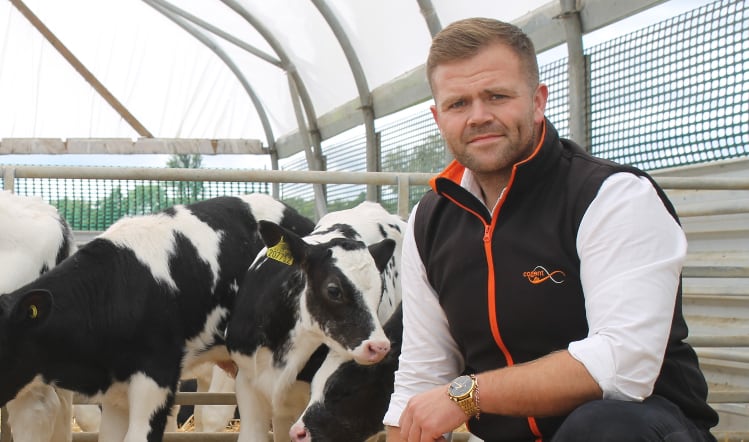How much beef in the UK comes from the dairy herd?
It is estimated that around 60% of all beef in the UK is a product of the dairy herd, with this figure predicted to continue in an upward trend over the next five years. Therefore, improving the quality of these cattle can bring benefits to both dairy farmers and the wider beef supply chain.
At Cogent, our Beef Breeding Programme focusses on developing reputable and bespoke genetics for specific sire breeds, ensuring that these consistent and desired sire lines and their marketable traits flow through to the cross-bred calf.
There is an ever-increasing demand of using beef semen in the dairy herd, so we designed the programme to deliver consistent and repeatable genetics, which can help guide breeding decisions to benefit the whole dairy-cross-beef market.
What can be done to make this work across the whole supply chain?
To achieve greater food security through breeding dairy-cross-beef calves, there must be value and profit for the dairy farmer and a high-quality end product suitable for the retail market.
Cogent is the earliest pioneer of sexed semen technology, so through years of ongoing research and development, we have worked to solve this issue, applying our expertise to the dairy-cross beef market specifically.
We have partnered with some of the most forward-thinking and progressive beef herds in the UK to provide a product which meets the requirements of stakeholders at every part of the supply chain.
While retailers and consumers are looking for consistency in the end product, this has to work within any dairy farming system too. So, by utilising advanced breeding technologies and working closely with our breeders, we are able to provide these genetics that tick boxes for the whole industry.
For example, bulls are not only bred for dairy industry-desired traits such as conception rate, calving ease and gestation length, but with a great focus on carcase quality and carcase consistency to benefit retailers and consumers.
So, there’s a solution for all stakeholders - from the dairy farmer who is looking for high quality calves, to the grower who is looking for efficient, fast daily liveweight gain, and the finisher who is looking for correct ratios of muscle and fat.
And the final point, where beef enters the supply chain, carcases are meeting the processor’s spec, with minimal waste.
How does data play a role in this?
One of the drawbacks of the dairy-cross-beef supply chain is lack of visibility, so Cogent has partnered with Pathway Farming, an integrated beef business, which takes dairy-cross-beef calves through to finish to the end consumer, through a long-term contract with M&S, supplying high quality Aberdeen Angus beef to M&S customers.
This partnership enables transparency and feedback to complete the loop. We’re collecting data from over 318,000 data points, increasing on a bi-weekly basis, which enables us to monitor both the bull and its progeny’s performance up to the point of entering the supply chain.
By closely monitoring these figures, and making them available to farmers, we not only get a monetary value that can be used to predict the financial benefits of using such genetics within dairy enterprises, but it also allows us to make continuous improvements within the programme when making breeding decisions.
Which specific benefits can this bring to the end product and the consumer?
It is known that the likes of M&S and its customers, plus other retailers, are placing an increasing importance on reducing the environmental footprint of beef.
This breeding programme helps to understand and benefit from the data to produce animals which eat less and grow faster through sire selection, to reduce the environmental footprint of each animal.
We’re looking for the best performing animals throughout their life, from early life data through to the carcase quality to streamline and drive profitability through the whole supply chain.
What can the data tell us?
Early figures from the programme show bulls originating from the breeding programme averaging 512 days to slaughter, which is significantly lower than the national average age. This is coupled with over 87.4% of progeny achieving a 4L fat grade and below.
Conformation is also attractive, with 97% of slaughtered progeny hitting a 0+ grade or higher. High carcase dead weight coincides with strong kill out percentages, which are consistently averaging above 51.7%.
The top eleven Aberdeen Angus bulls for intramuscular fat (IMF) within the Breed Society register in 2021 were bred and developed by Cogent as a result of the beef programme, providing excellent eating quality, and ticking boxes for the retailer and consumer.
We plan to release more intricate data later in the year, which will demonstrate the ongoing progression made within the breeding programme.
With the expected growth of the dairy-cross-beef market, these continuous data-driven improvements mark a real opportunity for the future of beef supply chains and securing readily available British beef.

